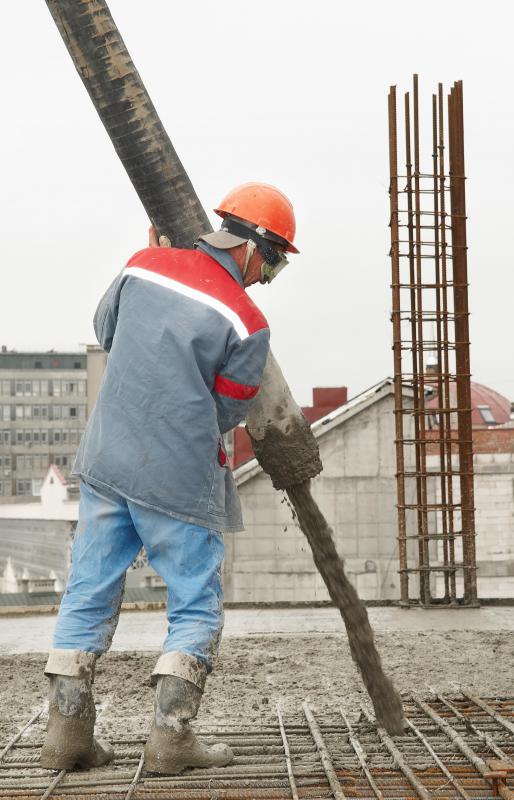At PracticalAdultInsights, we're committed to delivering accurate, trustworthy information. Our expert-authored content is rigorously fact-checked and sourced from credible authorities. Discover how we uphold the highest standards in providing you with reliable knowledge.
What does a Concrete Mason do?
A concrete mason is a construction worker who builds many different types of structures using cement. He or she typically pours, smoothes, finishes, and colors concrete using a set of specialized techniques and tools. Some masons act as supervisors at job sites, directing other laborers to ensure quality and efficiency. Most concrete masons are employed by municipal government organizations and construction companies, though some experienced workers successfully operate their own contracting businesses.
When starting a job, a concrete mason typically first builds forms out of wood or metal to contain wet cement. He or she then pours the concrete mixture into the form, taking care to fill the entire area and minimize air pockets. The mason is able to level the concrete and clear away excess with a variety of different types of trowels. Specialized chisels and edging devices can be used to add detail and decoration.

Workers usually specialize in a particular type of construction work. For example, a concrete mason may work with a crew that pours or lays foundations for buildings and homes. Experts at specialty companies build concrete support beams and standard-sized slabs that are later used in construction projects. Masons who are employed by municipal governments engage in large public works projects, such as building roads, highways, sidewalks, bridges, and dams.

Some masons work as private contractors, buying their own equipment and advertising their services to land, home, and business owners. A contractor may work alone or hire assistants to help with projects. He or she typically meets with clients to plan jobs and negotiate rates. Contractors can work on a variety of projects, including driveways, patios, retaining walls, and decorative pieces. Many contractors also perform repair jobs on old and damaged structures.

Construction projects are often extremely labor-intensive and involve working outside in all kinds of weather conditions. A concrete mason must be physically fit enough to spend several hours walking, bending over, and using tools. He or she also needs strong reasoning and communication skills to solve problems that occur at the job site and work effectively with other construction experts.

Most concrete masons learn the trade through on-the-job apprenticeships, though some choose to enroll in technical school programs to hone their skills and improve their chances of finding steady employment. A new concrete mason usually assists more experienced workers for several months or years before independently taking on projects. With time and experience, a mason may be able to advance within a company or organization to the role of site supervisor. Most masons who choose to work as contractors do so after gaining several years of experience and building a good reputation in the construction business.
AS FEATURED ON:
AS FEATURED ON:
















Discuss this Article
Post your comments